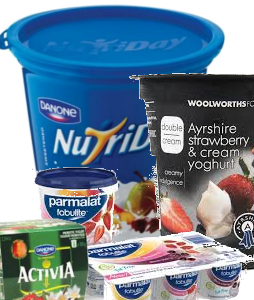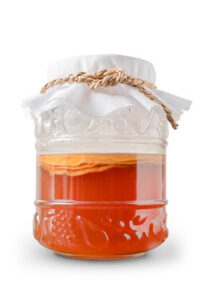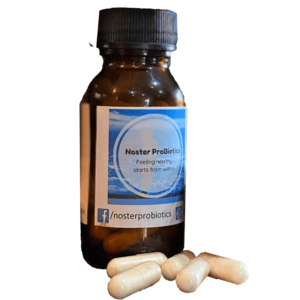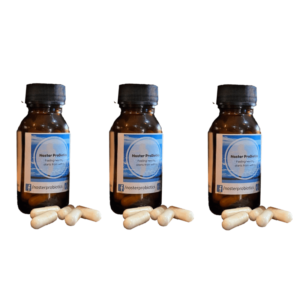Probiotics are tiny living organisms that can make a big difference in how your tummy feels. Explore some of the top probiotic foods for better digestion and overall well-being. From yoghurt to kimchi, many tasty options can support your gut health and boost your immune system.
Key Takeaways on Top Probiotic Foods For Better Digestion
- Probiotic foods contain live beneficial bacteria
- Common examples include yoghurt, kefir, and kimchi
- They can support digestive and immune health
- Eating a variety of probiotic foods is recommended
- Supplements like Noster Probiotics offer additional options
- Talk to a doctor before starting probiotic supplements
Understanding Probiotics and Gut Health
Probiotics are helpful bacteria that live in your gut. They help break down food, fight off harmful bacteria, and support your immune system. The link between gut bacteria and overall health is essential. Your gut microbiome can affect your mood, skin, and even weight. Probiotics keep your digestive system balanced, which helps your body absorb nutrients better.
Top Probiotic-Rich Foods for Digestive Health
Let’s look at some tasty foods packed with probiotics. These can help keep your tummy happy and your digestion smooth. Different foods have different types of good bacteria, so eating a variety is good.
1. Yoghurt: The Probiotic Superstar
Yoghurt is a well-known probiotic food. It’s made by fermenting milk with friendly bacteria. When choosing yoghurt, look for ones that say “live and active cultures” on the label. Greek yoghurt is often higher in protein and lower in sugar than regular yoghurt. You can eat yoghurt plain, add it to smoothies, or use it as a topping for fruits and granola.
2. Kefir: Yoghurt’s Tangy Cousin
Kefir is like a drinkable yoghurt with even more types of probiotics. It’s made by adding kefir grains to milk. The result is a tangy, slightly fizzy drink full of good bacteria. You can find non-dairy kefir made from coconut water or juice. Kefir is great for people who have trouble digesting lactose and is rich in calcium and vitamins.
3. Sauerkraut: Not Just a Hot Dog Topping
Sauerkraut is made by fermenting finely cut cabbage. It’s full of probiotics and also rich in vitamins C and K. When buying sauerkraut, look for unpasteurized versions to get the most probiotics. You can eat it as a side dish, add it to sandwiches, or mix it into salads for a tangy crunch.
4. Kimchi: Spicy and Probiotic
Kimchi is a Korean dish made from fermented vegetables, usually cabbage, mixed with spices. It’s packed with probiotics and has a unique strain called Lactobacillus kimchii. If you like spicy food, kimchi is a great way to get probiotics. You can eat it as a side dish or add it to stir-fries.
5. Kombucha: The Trendy Tea with Benefits
Kombucha is a fermented tea that’s become very popular. It’s made by adding bacteria, yeast, and sugar to tea and letting it ferment. The result is a fizzy drink full of probiotics. Kombucha may also have antioxidant properties. When buying kombucha, check the sugar content as some brands can be high in added sugars.
Noster Probiotics: Supplementing Your Digestive Health
Sometimes you might need an extra boost of probiotics. That’s where Noster Probiotics come in. These supplements can support your digestive health and complement your diet. They’re beneficial when travelling, stressed, or taking antibiotics.
Noster Probiotics offer several benefits:
- Contains 10 healthy probiotic strains
- 20 billion colony-forming microflora per capsule
- Made in a GMP and HACCP-approved facility
- Supports overall digestive health
- Shelf-stable formulation
Combining Probiotic Foods and Supplements for Optimal Digestive Health
Try combining probiotic-rich foods with supplements like Noster Probiotics for the best results. This gives you a wide variety of beneficial bacteria, which is key to a healthy gut. Different types of probiotics can have different effects, so variety is essential.
Here’s a simple way to incorporate probiotics into your daily routine:
Step 1: Breakfast
Start your day with a probiotic-rich breakfast like yoghurt with fruit
Step 2: Lunch or Dinner
Include fermented foods like kimchi or sauerkraut as a side dish
Step 3: Before Bed
Take a Noster Probiotic supplement (20 billion CFU per capsule)

Beyond Digestion: Other Benefits of Probiotics
Probiotics can do more than help with digestion. Some studies suggest they might help with:
- Boosting your immune system
- Improving skin health
- Managing anxiety and depression
- Supporting heart health
- Potentially aiding in weight management
- Alleviating symptoms of specific allergies and eczema
Scientists are still learning about all the ways probiotics can help us. If you want to know more about how probiotics might affect your mood, check out this article on probiotics and anxiety.
Tips for Incorporating Probiotics into Your Diet
- Start small: Introduce probiotic foods slowly to avoid digestive upset.
- Be consistent: Try to include a probiotic food or supplement in your diet every day.
- Mix it up: Don’t just stick to one type of probiotic food. Variety is suitable for your gut!
- Check labels: Look for “live and active cultures” on food labels.
- Store properly: Keep probiotic foods refrigerated.
- Pair with prebiotics: Eat garlic, onions, and bananas to feed your good gut bacteria.
- Consider timing: Experiment to see when taking probiotics works best for you.
Conclusion: Embracing a Probiotic-Rich Lifestyle
Adding probiotic-rich foods to your diet is a tasty way to support your digestive health. From yoghurt to kimchi, there are many delicious options. Supplements like Noster Probiotics can help when you need an extra boost. Probiotics work best as part of a balanced, healthy diet and lifestyle.
A healthy gut is key to feeling good overall. Making probiotics a regular part of your diet takes a big step towards better digestive health. Why not start today? Your tummy will thank you! Pay attention to how your body responds and talk to a doctor if you have any concerns. Here’s to a happier, healthier gut!






